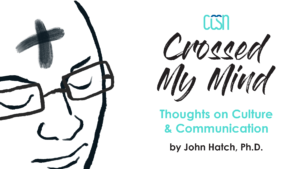 Column title: Crossed My Mind: Thoughts on Culture and Communication
Column title: Crossed My Mind: Thoughts on Culture and Communication
Column entry: “Why Voddie Baucham’s Fault Lines Should Be Read with a Critical Eye”
By John Hatch, Ph.D.
Eastern University (retired)
CCSN Senior Fellow
Column Description: As Christians, we are called to have the mind of Christ. This goes against the grain of our social and cultural conditioning. We seek personal or political advancement; Christ seeks the lost and the least. We grasp for cultural ascendency; Christ descends to the cross of love. This column is dedicated to thinking about culture and communication under the sign of the cross.
October 2023 / July 2023 / June 2023 / May 2023 / April 2023 / March 2023 / February 2023 / January 2023 / December 2022 / November(2) 2022 / November 2022 / October 2022 / August-September 2022 / June-July 2022 / January 2022 / December 2021 / October-November 2021
October 2023
Why Voddie Baucham’s Fault Lines Should Be Read with a Critical Eye
Within the past year, five of my columns have discussed books about race and the Church. The most recent was Christianity and Critical Race Theory: A Faithful and Constructive Conversation. I offered a positive appraisal of the book, arguing that it “helps us see where CRT mirrors some of the revelatory insight of Scripture, where it fails to reflect the light of revelation, and how it can serve as an essential part of working toward wholeness in the Church and society.” In a review for the Journal of Christian Teaching Practice, I wrote, “While it certainly won’t settle debate about CRT among Christians, Christianity and Critical Race Theory does set the table for a better conversation.” I also noted that it “may not go far enough to convince those who deem the existence of structural racism to be exaggerated or believe CRT to represent a worldview in competition/conflict with Christianity.”
Prominent among those who hold such views is Voddie Baucham, author of Fault Lines: The Social Justice Movement and Evangelicalism’s Looming Catastrophe. Unlike the other books I’ve discussed, Baucham’s is a national bestseller and has had significant impact in conservative Christian circles.
While Fault Lines contains some serious problems, in my view, it should not be glibly dismissed. Baucham is a thoughtful and rhetorically sophisticated writer, and the flaws in his argument are easy to miss if one has given little thought to racial/social justice or is already inclined to agree with his position. (Conversely, if one is invested in the opposite position, it is tempting to dismiss Baucham without doing him justice or accurately pinpointing his fallacies.) What’s more, Voddie Baucham is a conservative black Christian leader, making him a minority within a minority. If we are committed to truth—the whole truth—it’s important to listen to a diversity of minority voices, not reducing them to a presumed monolithic point of view or dismissing those that don’t fit the mold.
That’s why I’m devoting the next 2-3 columns to Baucham’s influential book. In this column, I highlight its potentially positive contributions to Christian discourse about race and social justice. In subsequent columns, I’ll unpack ways in which Fault Lines unfortunately undermines that potential and, in my estimation, ends up doing more harm than good.
Across Baucham’s book, two strengths stand out for me: the story of his personal journey and his critiques of simplistic claims about race and racism. These strengths are primarily evident in the first three chapters.
Baucham builds context and credibility in chapters 1 and 2 by sharing his story as a black man who grew up in challenging circumstances and eventually found himself rubbing elbows with prominent Christian leaders. The first chapter recalls how Baucham felt unwelcome at the white elementary school to which he was bussed from a poor neighborhood in Los Angeles. It also describes his youthful penchant for getting in trouble and underperforming academically to fit in socially with his black peers. Most important, Baucham recounts the ways in which his mother gave him a sense of safety, agency, and accountability in life, both encouraging and disciplining him toward the highest standards of achievement. These experiences, he explains, convinced him of “the importance of family and personal responsibility,” regardless of one’s race.
Baucham begins chapter 2 by alluding to “a major debate among black evangelicals as to whether, in discussing and applying our faith in the midst of the current cultural crisis, the priority should be on our blackness or our Christianity.”[i] He acknowledges that he has “wrestled with this question since coming to faith,” and “fallen on both sides of it at different times.”[ii] For Baucham, an emphasis on blackness came first: he describes the proud Afrocentrism he brought with him into college and discusses his early involvement in social work and advocacy for children “whose stories were similar to my own: poor kids from rough neighborhoods whose fathers were not in the picture.”[iii] He recounts coming to Christian faith through a Campus Crusade staffer; feeling welcomed by members of the Southern Baptist denomination (which he joined); and being courted by its leaders during his doctoral studies. Although Baucham’s early church ministry was within black congregations, the call to racial reconciliation eventually convinced him to take a position in a predominantly white church, where he “struggled over the years to strike a balance between working to promote [racial] unity and working to make it a non-issue.”[iv] Meanwhile, he was drawn to the land of his ancestors and eventually became the dean of the School of Divinity at African Christian University. As Baucham tells it, his experiences in Africa have led him to appreciate the cultural values of the United States and the comparative integrity of law enforcement here.
Taken together, the multifarious threads of Baucham’s identity as a black Christian belie what he characterizes as “a false dichotomy that says: ‘Either you are on the side of the oppressed [i.e., a social justice warrior], or you are 1) shutting down the conversation about racial injustice, 2) ignoring minority voices, and 3) upholding (or internalizing) white supremacy.”[v] Baucham’s story suggests that matters are more complex than this.
This brings me to the second strength I see in Fault Lines: challenging false or simplistic assumptions about race. In chapter 3, Baucham challenges the popular picture of systemic racism in policing. Focusing on prominent recent cases (George Floyd, Tamir Rice, Philando Castile, Michael Brown, and Breonna Taylor), Baucham shows either that a closer look at the facts does not support claims of bad policing or that there have been very similar cases of police brutality involving white victims (which failed to make national news). Regarding disproportionate killing of black people by police, he shows that other factors than race are in play. An analogous situation is seen with gender: police kill far more men than women, but this is because males commit the vast majority of violent crimes, not because of anti-male bias. While Baucham does not provide a fully nuanced account of race and policing, his point is well taken: justice will not be done if we leap to conclusions before all the facts have been gathered and tested.
Later in the book, Baucham contests simplistic ideas associated with Critical Race Theory. One of these is the notion that there is a “singular black perspective” on race issues, and any black individual who does not align with this perspective is a sellout or has internalized anti-black racism. Clearly, Baucham is one of those individuals, and yet his story bespeaks greater complexity than this judgment suggests. Another simplistic idea is that minorities’ stories of racial mistreatment should be summarily accepted as truth. As Baucham points out, alleged victims and witnesses may be sincerely wrong, misinformed, or in some cases lying about purportedly racist behavior they’ve experienced/observed. Narrative alone is not sufficient to establish truth; a judicious examination of all the facts is required.
Which brings me to the conclusion of this column and stepping-off point for the next one. If the strength of Fault Lines resides in Baucham’s willingness to contest oversimplified and misleading claims about race and racism, the book’s weakness lies in his eagerness to make bold, simplistic, and fallacious claims in service of his own argument about creeping heresy and “looming catastrophe” in the Church. This hyperbolic argument comprises the book’s raison d’etre and poses a danger, I would argue, to the very Body of Christ he is seeking to protect. But that’s a subject for another column.
* The views of any CCSN columnists are their own, and do not necessarily represent the views of the CCSN. We invite and embrace a wide range of views and critiques on important communication and cultural issues from a Christian perspective. The CCSN is a community of Jesus followers who study communication. We do not support or promote a particular social, political, or denominational agenda.
Notes
[i] Voddie T. Baucham Jr., Fault Lines: The Social Justice Movement and Evangelicalism’s Looming (Washington, DC: Salem Books, 2021), 21.
[ii] Baucham, Fault Lines, 21.
[iii] Baucham, Fault Lines, 28.
[iv] Baucham, Fault Lines, 35.
[v] Baucham, Fault Lines, 29.

